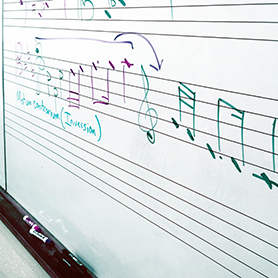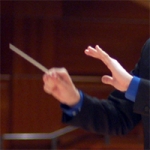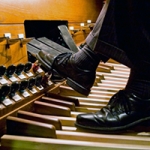Diplomas
| DMA, Composition | 2014 | |
| University of Miami; Coral Gables, FL | ||
| Doctoral Essay: | “An American Evensong: The Application of an Anglican Worship Service to a Large-Scale Choral Concertpiece” | |
| MM, Composition | 2010 | |
| BM, Theory and Composition | 2008 | |
| University of Tennessee; Knoxville, TN | ||
| Master Thesis: | “Seasons for a Cynic: A Compositional Process Utilizable for a Program Symphony” | |
| Bachelor Project: | Composed a full orchestra concert program for 43 student volunteers (soloists, performers, and conductors) | |

Primary Instructors
| Composition: |
Dr. Dorothy Hindman Dr. Dennis Kam Dr. John Stewart Dr. Kenneth Jacobs |
| Theory Pedagogy: |
Dr. Paul Wilson Dr. Barbara Murphy |
| Musicology Pedagogy: |
Prof. Frank Cooper |
| Conducting: |
Dr. Angela Batey Maes. James Fellenbaum Dr. Don Ryder |
| Voice: |
Prof. Andrew Skoog |
Universities
| Kennesaw State University; Kennesaw, GA | |
| Assistant Professor | 2022–pr. |
| University of Miami; Coral Gables, FL | |
| Experiential Music Curriculum Leader | 2017–22 |
| Frost Preparatory Academy Instructor | 2014–22 |
| Adjunct Lecturer | 2013–22 |
| Graduate Teaching Assistant | 2010–13 |
| University of Tennessee; Knoxville, TN | |
| Graduate Teaching Assistant | 2008–10 |

Courses Taught
Aural Skills I-IV (Experiential Music Curriculum)
Aural Skills I-IV (Traditional)
Music Theory I-IV (Experiential Music Curriculum)
Music Theory I-IV (Traditional)
Fundamentals (majors and non-majors)
Class Composition
Music Technology
Scoring for Media
Instrumentation and Arranging
Choral Arranging
Analysis and Experience
Advanced Counterpoint (graduate level)
Institutions
| St. Bede Episcopal Chapel; Coral Gables, FL | |
| Music Director and Organist | 2011–22 |
| Miami Music Project Youth Orchestra; Miami, FL | |
| AYO Dean of Musicians | 2014 |

Roles
Recruitment
Audition adjudication
Member and guest artist correspondence
Venue scheduling and programming
Ensemble and choir directing
Library assistance and upkeep
Piano, Organ, and Harpsichord |
|
|---|---|
| Soloist/Accompanist | 2004–pr. |
| St. Bede Episcopal Chapel (Coral Gables, FL) | 2011–22 |
| University of Miami Collegium Musicum | 2014–19 |
| Miami Bach Society | 2014–19 |
| St. John’s Lutheran Church (Knoxville, TN) | 2009–10 |
Flute and Baroque Recorders |
|
| Miami Bach Society | 2011 |
| University of Miami Frost Chorale | 2011 |
| University of Tennessee ensembles | 2009–12 |
Euphonium and Bass Trombone |
|
| University of Tennessee ensembles | 2004–08 |

Vocalist (classical) |
|
|---|---|
| Soloist | 2008–pr. |
| Anglican Chorale of Southeast Florida | 2011–19 |
| University of Miami Collegium Musicum | 2013–19 |
| Miami Bach Society | 2013–19 |
| Trinity Episcopal Cathedral (Miami, FL) | 2013–19 |
| University of Miami Frost Chorale | 2010–13 |
| Ocean Reef Chapel Choir (Key Largo, FL) | 2010–12 |
| University of Tennessee ensembles | 2004–10 |
Vocalist (contemporary) |
|
| BisCaydence a cappella group (Coral Gables, FL) | 2011 |
| VOLume a cappella group (Knoxville, TN) | 2009–10 |
| Tennessee Valley Players (Knoxville, TN) | 2009–10 |
TEACHING PHILOSOPHY
As an educator, I consider my primary role to encourage my students in their progress towards mastery of music theory and/or composition. In the field of music theory, this constitutes the ability to analyze the mechanics of any piece of music and communicate said analysis to others, noting what makes the piece unusual, unique, or effective. In composition, mastery would be the ability to compose in a variety of styles, while defining one’s own consistent “voice” as a composer, effectively expressing and developing their own ideas over well-timed artistic statements.
However, I am called to do more than present these skills and materials to our students for their competency or mastery. I must also nurture an environment that encourages critical thinking and application of the material across genres, so that the student can see why these skills are worth knowing as versatile musicians. Regarding application specifically, I take particular inspiration from David Elliott’s praxial philosophy, putting every lesson into an exercisable context. My students are encouraged to apply their classroom exercises creatively to their everyday practice routine (e.g. improvising their daily warm-ups, analyzing the repertoire they’re practicing, etc.). The University of Miami’s Experiential Music Curriculum incorporates both composition and improvisation into their theory and aural skills classes, and my observations of and participation in the curriculum have inspired me to write my own methods book for instrumentalists and vocalists encouraging this practical application of music theory. It is partly because of this inspiration that I began a leadership role in the fall of 2017, helping to choose course materials and supervise other instructors in the program.
To foster critical thinking, I encourage an open dialogue with my students during my large lectures. For my spring 2017 Advanced Counterpoint class (MTC518/618 for undergraduate and graduate students), I facilitated this by making 60% of the final grade hinge on class participation. As a result, the fifteen students showed a stronger interest in the material, asked more challenging questions, and posited more educated ideas than I had seen in years past from other classes. More so, the students outwardly expressed their enjoyment of the material, describing fugue analysis as not only enlightening but also a genuinely fun activity. Though the majority of the students had little to no experience composing, every student expressed excitement to tackle their midterm and final composition projects so that they could put their newly developed skills to practice.
That sense of “fun” should not go under-acknowledged in any music theory class. If I am not enthusiastic about the material I am presenting, I cannot expect my students to be engaged, and without that emotional investment they will be less successful in their approach to my classes. This can be demonstrated in something as simple as illustrating the relative major group in minor keys: “The VI chord is one of my favorite chords, and here’s why!” In one of my previous instructor evaluations, a student remarked that “watching Dr. Pegel ‘nerd out’ over the material made me want to participate in his class every day, even though it was music theory at 8am Monday mornings.” That sort of feedback has influenced me as an educator more so than any other.
Throughout my nine years of experience teaching at the collegiate level, I have learned many valuable lessons, the most important of which is discerning the difference between effective teaching and “talking in front of the class about what you know.” As I further grow, I intend to always take my students’ feedback seriously, be open to experimenting with my curriculum layouts, and persistently research new and effective ways of teaching. This will allow me to continually express interest in both my students’ progress and in them as human beings. It is my hope that as a result, we will have a new generation of inspired young adults ready to invigorate the world of music theory and composition.
| Florida Music Educators Association | (FMEA) | 2017-pr. |
| National Association for Music Educators | (NAfME) | 2017-pr. |
| College Music Society | (CMS) | 2008-pr. |
| American Society for Composers, Authors, and Publishers | (ASCAP) | 2013-pr. |
| Alliance Music Publications, Inc. | 2013-pr. |
